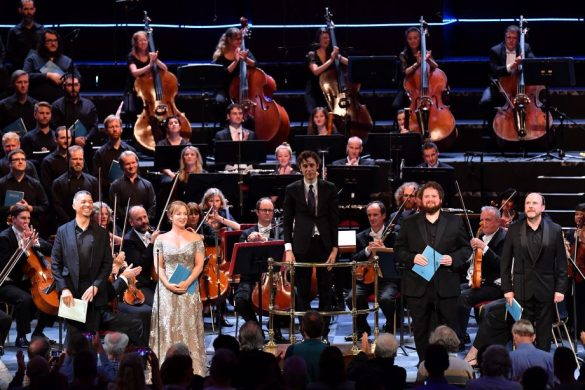
 United Kingdom BBC PROM 37 – Berlioz: Soloists, Britten Sinfonia Voices, Genesis Sixteen, Hallé / Maxime Pascal (conductor). Royal Albert Hall, London, 14.8.2019. (CC)
United Kingdom BBC PROM 37 – Berlioz: Soloists, Britten Sinfonia Voices, Genesis Sixteen, Hallé / Maxime Pascal (conductor). Royal Albert Hall, London, 14.8.2019. (CC)

Berlioz – L’enfance du Christ
Narrator, Centurion – Allan Clayton
Polydorus, Joseph – Roderick Williams
Herod – Neil Davies
Virgin Mary – Julie Boulianne
Father of the Family – Neal Davies
Out of adversity comes triumph. No, not the myth of the baby Jesus and his humble manger, but the story of this very performance. With Dame Sarah Connolly cancelling at least with enough time to inform us of the change in the programme, and Sir Mark Elder cancelling through illness later still (surgery to relieve trapped nerves in his back), the odds seemed stacked against this evening’s entertainment. The replacement conductor, Maxime Pascal, I last encountered in Stockhausen, whose music is an antipode to Berlioz in a number of ways (although they both shared a fondness for largesse in music). The replacement mezzo, French-Canadian singer Julie Boulianne, has been paired with Allan Clayton recently in Berlioz also, in Glyndebourne’s La damnation de Faust (reviewed for this site by Mark Berry; I went independently). She was a fine stand-in who can hold her own against anyone.
In fact, accurate description though ‘stand-in’ might have been, there was no sense of sticking-plaster soloist or conductor whatsoever. What we heard was revelatory, the Hallé sounding as fine as I have ever heard them (and I grew up with this band), the singing glorious. The use of the Royal Albert Hall’s spaces, too, for some of the choral moments (the Chorus of the Unseen Angels, obviously) seemed perfect for the occasion. It seems strange somehow that it worked so well: surely, goes the thought process, this hall is for the larger works, not his most intimate?
Pascal is an individual conductor, tall, thin, almost insectile. Batonless, his hands are remarkably expressive, as is almost every other bit of his body; and yet at other times he was willing to let the players just get on with it, with minimal movement on his part. The thing is, each gesture, or indeed non-gesture, had a point, and the orchestra responded magnificently, as did the choirs. But it was the detail, and the transparency, of the orchestra that stood out, with translucent strings and responsive, characterful woodwind, the latter very much in evidence right from the off in the Narrator’s first solo. The trio, for two flutes and harp, of the Young Ishmaelies (here flautists Amy Yule and Sarah Bennett with harpist Marie Leonhardt) was joy itself, the rapport between the three players the very definition of chamber music.
Pascal enabled us to hear Berlioz’s piece as a perfectly hewn complete experience; perhaps, dare I suggest it, we could have done without the interval and just bathed in Berlioz’s radiance instead? Pascal’s choral forces were brilliantly drilled and superbly balanced. And then, to cap it all, that fine line-up of soloists.
Allan Clayton was in his finest, most nuanced voice as both Narrator and Centurion. Every time I hear him, he seems to just get better, his ‘Les pèlerins étant venus’ including moments of great subtlety. His tone, too, seems to become ever sweeter in the quieter dynamics; and ‘Chaque nuit, le même songe m’épouvante’ was perfectly, idiomatically shaded. Julie Boulianne was a radiant Virgin Mary, and when Clayton and Boulianne sang together in ‘Adieu, merci, bon père,’ the result was the gentlest sort of dream-weaving. Roderick Williams characteristically melded superb diction with burnished sound; his immersion in the role of Polydorus complete; his Joseph, too, was as convincing as one could hope for, his ‘Seigneur! Sauvez la mère’ strong and ardent.
We also got the best of Neal Davies, his Herod beautifully focused, the weight of the world on his shoulders at ‘Ô misère des rois!’; significantly, the orchestra underscored this sadness brilliantly, an extension of Herod’s emotional spectrum rather than accompanist.
The orchestra played like Gods and Goddesses throughout, be it providing gossamer textures or honouring Berlioz’s infinite imagination. The passage of ‘cabalistic movements’ with the Soothsayers, where woodwind lines snake over very alive strings, was balanced by the gossamer, tender strings of the fifth scene (‘Ô mon cher fils’), while the rustic winds of the opening of the second part found just the right sense of local colour.
So, something of a revelation (small ‘r’) … one fervently hopes that Pascal will become an ever more familiar face in London. For those who stayed for the Late Night Prom (Solomon’s Knot in four Bach Cantatas), one can only imagine it must have been quite a night.
Colin Clarke
